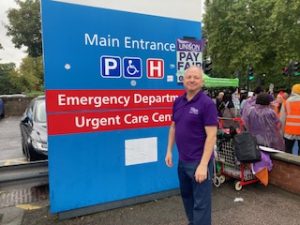Claims of ‘ethnicity pay gap’ as HCAs continue walk-out

Healthcare assistants (HCAs) in South East London are facing an “ethnicity pay gap”, strikers claimed today as they continue their campaign for fair pay.
Hundreds of HCAs at Lewisham and Greenwich NHS Trust, many of whom are Black, have been taking part in a 48-hour walk out since yesterday.
They are demanding fair remuneration for the work they have been undertaking above their pay grade for years, in many cases.
Nursing Times attended the picket line today at University Hospital in Lewisham and heard concerns from those taking industrial action about an ethnicity pay gap at the trust.
However, this claim was strongly disputed by the trust, which stressed its commitment to equality, diversity and inclusion.
The strike action at Lewisham and Greenwich is part of a national campaign by the union Unison to get HCAs up-banded, which has seen successes across the country over the past two years.
While the trust has agreed to up-band most the HCAs affected from band 2 to 3, a dispute is also ongoing over back pay.
Unison, which represents the HCAs, is asking for the equivalent of five years’ worth of back pay for the support workers.

Michael Walker
Speaking to Nursing Times, Michael Walker, Unison regional officer for London, highlighted the union’s concerns about a “ethnicity pay gap”.
He noted how the trust had acknowledged that the majority of HCAs had been working beyond their pay grade, as it had agreed to up-band around 500 out of 800 HCAs.
“So, it means that… historically, there’s been an injustice,” Mr Walker said.
“And why is that, in the whole of London, that in Lewisham hospital, they’ve had so low banding for so long?
“What we fear is, [it is] because they are Black workers,” added Mr Walker.
He said it was only fair that the HCAs – some of whom have worked for decades on band 2 – were given the back pay that they are asking for.
Among the strikers on the picket line was Jenifer Lang, who has been working at the trust as a band 2 HCA since 2010.
According to Agenda for Change, band 2 staff should be limited to delivering personal care such as helping patients with dressing, eating, washing and going to the toilet.
However, Ms Lang, who is based on a surgical ward, said: “We do much more than that, and it’s not fair. It’s about time they recognise us. They don’t respect us.”

Jenifer Lang
She said that, over her 14 years at the trust, she had been undertaking clinical skills that should be renumerated as a band 3, including patient observations and electrocardiograms (ECGs).
As a band 2 HCA, she had even trained nurses and sometimes stood in to “work the bay” until a nurse returned.
“They don’t give that responsibility to just anybody. They give it to us, but they don’t want to respect us for it,” she added.
Ms Lang agreed with Mr Walker’s view that HCAs were suffering an ethnicity pay gap.
“It’s a predominantly Black [London] borough,” she told Nursing Times. “Outside of London, where it’s predominantly White, they’ve all got their back pay and their up-banding without any fuss.
“Now, we have to fight tooth and nail here, I think, because we’re a predominantly Black borough,” she said.
“It’s been the same for services in this borough all the time, where we have to fight tooth and nail to get anything, to get any recognition, and it shouldn’t be like that.”
She compared the role of HCAs in healthcare as being like the “scaffolding that holds up a building”, and said that needed to be recognised.

Clinton Emeka Okechukwu
Also on the picket line was Clinton Emeka Okechukwu, who has worked as an HCA at the trust for two years and is based on a stroke ward.
As well as patient observations and ECGs, he said HCAs at the trust delivered stoma and catheter care, cannulation and even performed cardiopulmonary resuscitation (CPR).
The fact that HCAs had given up two days of pay showed the strength of feeling behind the strike, noted Mr Okechukwu, who warned that “enough is enough”.
“We are here to protest about fair pay, and also for them to know that we are doing a great job – we need to be respected and we need to be rewarded,” he told Nursing Times.
The HCAs at Lewisham and Greenwich have a strike mandate until February 2025 and Unison has warned that more action will follow if the dispute goes unresolved.
A spokesperson for Lewisham Greenwich said the claim about an ethnicity pay gap was an “unfair allegation that we take very seriously”.
“As a trust, we are committed to being anti-discriminatory and have been recognised for the work that we do in the equality, diversity and inclusion space,” they said.
They said the trust’s workforce was representative of its local community with more than 61% of its permanent team members being Black, Asian or from another minority ethnic background, and that it had doubled the number of leaders who are from minority groups.
“We are disappointed to hear it implied that this dispute is about race, as that is not the case,” they added.
“We value all of our healthcare support workers and everything they do to care for patients and have undertaken a range of programmes to improve their experience at work.
“We are in open discussions with Unison to find a resolution to get our teams back on our wards doing what they do best and caring for our patients,” they said.
HCAs at @LG_NHS are still on the picket line demanding fair pay. More in @NursingTimes later pic.twitter.com/pVocCVl05W
— Gemma Mitchell (@gemmamitchell92) September 5, 2024






